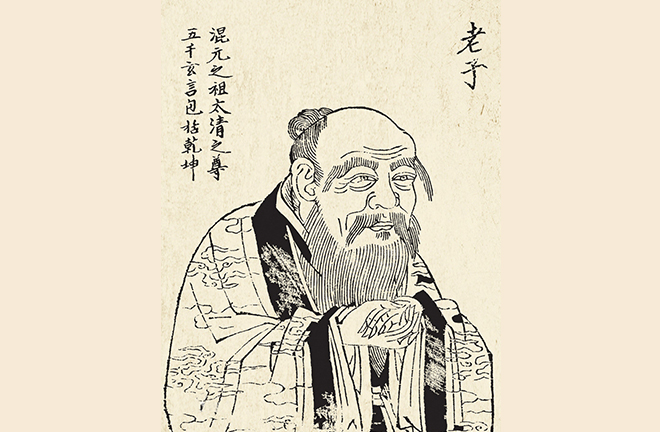Exploring ‘mind’ and ‘self’ in philosophy

FILE PHOTO: Traditionally traced to Laozi, Taoism stands alongside Confucianism as one of the two great philosophical systems of China.
“Mind” and “self” are concepts that are constantly explored throughout the history of both Chinese philosophy and Western philosophy. At a webinar on August 12 and 13, scholars exchanged ideas on both Chinese and Western thinking on these two concepts.
Awakening of human subjectivity
The appearance of mind and self in the history of Chinese and Western philosophy reflects the awakening of human subjectivity in rational thinking.
Nie Minli, a professor from the School of Philosophy at Renmin University of China, noted that both Chinese and Western philosophy are concerned with the relationship between mind and self. Classical philosophy presupposes the identity of thinking and existence. Generally speaking, it is a philosophy without subject, or a philosophy without self-awareness of subjectivity. Modern philosophy, which has established subjectivity, always sees the tension between thinking and existence.
Some scholars have raised questions about this thesis. For example, can the iterative statements of various schools of pre-Qin China (before 221 BCE) on xin (heart and mind) and xing (nature) be regarded as the establishment of subjectivity?
Nie argued that both self and mind are moral subjects, whether according to the Stoicism of ancient Greece or pre-Qin Confucian philosophy.
Based on the analysis of mind in unearthed documents, Wang Zhongjiang, a professor from the Department of Philosophy and Religious Studies at Peking University, argued that the theory of mind and philosophy of mind in the Eastern Zhou Dynasty (770–256 BCE) were basically integrated with the cultivation of personal spirit and reason, ethical cultivation, and political practice. There is a certain similarity between this and the theory in Anthony Long’s Greek Models of Mind and Self.
If the emergence of the concept of self in the history of Western philosophy means the establishment of the principle of subjectivity in epistemology, then the advanced Chinese civilization in the pre-Qin philosophical period had a more obvious spiritual breakthrough, by advocating “He who has exhausted all his mental constitution knows his nature. Knowing his nature, he knows Heaven [see Mencius].”
Comparative study
When comparing Chinese and Western philosophies, it would be biased to claim that Western philosophy only values the construction of self in epistemology and that Chinese philosophy only focuses on the construction of self in the ethical and moral sense. In fact, even though the two have different purposes, Western philosophy also has a moral orientation, and Chinese philosophy does not lose the epistemological dimension.
Confucianism was among the Hundred Schools of Thought that flourished from 770 to 221 BCE in China. The pre-Qin scholars of that era showed consistency when it comes to “knowing the point where to rest,” said Wang Zheng, an associate senior editor from the Institute of Philosophy at the Chinese Academy of Social Sciences. “They all held an epistemological attitude that cognition should have limits and therefore cannot develop endlessly.”
Confucianism gives a moral reason for “knowing the point where to rest,” advocating that one needs to recognize one’s position in interpersonal relations and the appropriate behaviors determined thereby. Taoism explores the true meaning of one’s own life, and “knowing the point where to rest” is an important state of life or spiritual realm, Wang Zheng elucidated.
According to the pre-Qin scholars, cognition can have value only when cognition is limited to goals that have real life value and practical significance through “knowing the point where to rest,” Wang Zheng noted.
In recent years, unearthed documents have provided more textual options for scholars to discuss the concept of mind in early Chinese philosophy.
Through a combination of handed-down documents and unearthed documents, Wang Zhongjiang discovered that in the Eastern Zhou Dynasty, especially the Warring States period (475–221 BCE), while exploring the roots of the universe and all things, scholars also paid attention to and enthusiastically explored the inner nature of human beings, the nature of xin, and the relationship between xin and the body. In the unearthed texts, the theory on xin and the body emphasizes that xin can control and lead the body, under the premise of xin’s rational initiative and moral subjectivity.
Early Chinese thought did not discuss xin in isolation. It linked xin with one’s spiritual practice and social public order, said Chen Zhibin, an associate professor from the Yuelu Academy at Hunan University. The rationalization and legitimization of xin not only brings a truly beautiful and happy life to the individual, but also provides an important guarantee for the order and harmony of society and the universe.
Yao Xinzhong, a professor from the School of Philosophy at Renmin University of China, said that the self in Western philosophy is the mind, emphasizing the difference between mind and body. In contrast, the Confucian self emphasizes the unity of xin and the body, emphasizing the morality, rather than just reason, of xin.
“The self in Western philosophy emphasizes its individuality, while the self in Confucianism emphasizes its relationships,” Yao concluded.
Edited by JIANG HONG

 PRINT
PRINT CLOSE
CLOSE